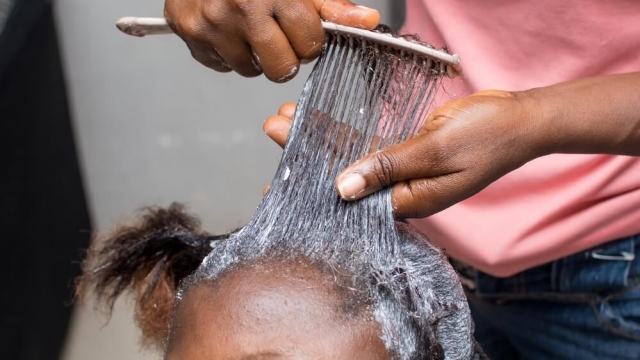Danielle Ward Mason started using hair relaxer when she was eight years old.
"When I was a child, I always wanted to engage in things that were active; I wanted to be a cheerleader. I wanted to swim. I wanted to do all of these things that absolutely require a lot of hair maintenance," said Mason.
So for Mason, that meant getting her hair straightened.
Fast forward a few decades, and Mason, with Bullock Ward Mason in Georgia, is an attorney representing women who say chemicals they used for decades to straighten their hair may have harmed their health.
Concerns about the products have prompted women, especially black women, to reconsider their hair styling routines; many are now exploring natural hair styles and taking legal action.
Hair plays a prominent role in the heritage of Black women.
"In Black women, ethnic hair has been for generations a real struggle," says Mason. "Being discriminated against, both societally and professionally, because of how we wear our hair, beauty was more synonymous with the silkier straighter hair. And hair relaxers were a means to be able to do that."
Techniques for hair straightening include towel drying, blow drying, using a flat iron, and applying straightening chemicals known as relaxers.
In 2022, the National Institutes of Healthpublished a study that linked chemical hair straighteners with an increased risk of uterine cancer.
"60 percent of the women who reported using straighteners or relaxers in the last year were Black women," says Alexandra White of the National Institutes of Health.
In October, the Food and Drug Administration proposed a ban on chemical straightening products that contain formaldehyde and similar chemicals.
"There are all kinds of straighteners, but these are the more permanent straighteners," says dermatologist Dr. Fayne Frey. "Some people are doing it once, and some people are doing it many times a year."
The FDA said the chemicals were linked to an increased risk of cancer as well as skin and breathing problems. The Department of Health and Human Services lists formaldehyde as a carcinogen, and last year the FDA issued a warning against chemical hair straighteners that release formaldehyde when heated up, calling for good ventilation.
"While I think that that's a significant move, I would like for the FDA to take it a step further," says Mason. "To evaluate the comprehensive nature of the chemicals that are in these products, to include the endocrine disruptors that are affecting women's natural hormonal function and what is leading to these chronic reproductive outcomes."
SEE MORE: FDA considering banning hair products linked to cancer risk
Techniques for hair straightening include towel drying, blow drying, using a flat iron, and applying straightening chemicals known as relaxers.
In 2022, the National Institutes of Health published a study that linked chemical hair straighteners with an increased risk of uterine cancer.
"60% of the women who reported using straighteners or relaxers in the last year were Black women," says Alexandra White of the National Institutes of Health.
In October, the Food and Drug Administration proposed a ban on chemical straightening products that contain formaldehyde and similar chemicals.
"There are all kinds of straighteners, but these are the more permanent straighteners," says dermatologist Dr. Fayne Frey. "Some people are doing it once, and some people are doing it many times a year."
The FDA said the chemicals were linked to an increased risk of cancer as well as skin and breathing problems. The Department of Health and Human Services lists formaldehyde as a carcinogen, and last year the FDA issued a warning against chemical hair straighteners that release formaldehyde when heated up, calling for good ventilation.
"While I think that that's a significant move, I would like for the FDA to take it a step further," says Mason. "To evaluate the comprehensive nature of the chemicals that are in these products, to include the endocrine disruptors that are affecting women's natural hormonal function and what is leading to these chronic reproductive outcomes."
Mason represents a number of women suing several prominent hair product companies in cases in Georgia and Illinois. And her firm is part of multi-district litigation that combined more than eight thousand lawsuits nationwide.
The suit targets major beauty companies. It alleges that hair products contain endocrine-disrupting chemicals that increase the risk of cancer. The plaintiffs further charge that companies knew the risks but failed to disclose them.
"These products have contained very harmful and toxic chemicals that have been hidden within the product that are not listed on the box, that women are not able to review the ingredients and know exactly what their risk is in using them," says Mason.
In a statement to Scripps News, one of the companies facing lawsuits, L'Oreal, said its customers' health and well-being were its "highest priority." It also said the allegations made in the suits have neither legal nor scientific merit.
Mason is not a plaintiff in the suit, but she says the chemicals may have harmed her.
"I was diagnosed with endometriosis at 12 years old," she says. "As years progressed, the condition got worse. My first son was born extremely prematurely."
Some stylists say that Black customers are moving away from toxic options. Mason urges women to be "very diligent about what we're using and what we're putting in our body." But the lawsuits, she adds, "say to manufacturers who make this product that we won't stand for making products that make us sick, that we won't stand for products that do us harm."
The FDA is expected to propose a formal rule on chemical hair straighteners in April. In the meantime, it recommends that consumers avoid products with formaldehyde or those that lack a list of ingredients.
Trending stories at Scrippsnews.com



